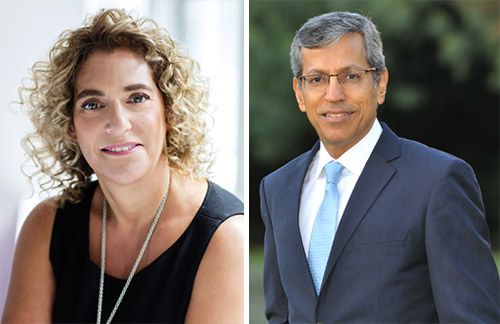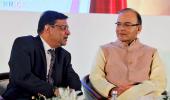 ‘As the world changes, we will be on a constant change programme too,’ advertising agency J Walter Thompson Global Chief Executive Officer Tamara Ingram and South Asia CEO Tarun Rai tell Viveat Susan Pinto.
‘As the world changes, we will be on a constant change programme too,’ advertising agency J Walter Thompson Global Chief Executive Officer Tamara Ingram and South Asia CEO Tarun Rai tell Viveat Susan Pinto.

The business of advertising has seen some dramatic changes over the past few years.
As markets in emerging economies have grown and evolved faster than those in the developed world, many agencies have had to rewire operations and rethink expansion strategies.
For most agencies, India represents an exciting opportunity. Its multi-lingual and diverse population and the sharp divides between consumption patterns in different parts of the country make it a challenging, but hugely rewarding market.
J Walter Thompson, India, has played an important part in the evolution of the advertising landscape in the country and is among the WPP group’s oldest and key operations.
Tamara Ingram, its 56-year-old global chief executive officer, says that India is one of its most exciting markets in the world today.
For all the emphasis on talent, the international advertising world is a man’s domain with few women at the top.
Her appointment this March -- she was formerly chief client team officer at WPP -- a week after a JWT executive filed a discrimination lawsuit in New York against then worldwide CEO Gustavo Martinez, signalled that WPP top boss Martin Sorrell was open to the idea of improving gender diversity at the top.
An executive with 30 years of experience behind her, Ingram brings on board the expertise of handling multiple advertisers including the top two -- Unilever and Procter & Gamble. She has also seen the global advertising environment change dramatically in the last few years.
On her first visit to India since taking over, Ingram, along with the agency’s South Asia CEO Tarun Rai, image, left, discuss the way forward in an interview with Viveat Susan Pinto.
 Martin Sorrell has repeatedly said how the axis of advertising has shifted from the West to the East. To what extent are you seeing this and where does India stand for JWT amid all this?
Martin Sorrell has repeatedly said how the axis of advertising has shifted from the West to the East. To what extent are you seeing this and where does India stand for JWT amid all this?
Tamara (left): What is happening is that there is this huge growth in local brands and less growth coming from global brands. At the same time, various brands are also becoming multi-regional, which explains why we are seeing this shift.
Where does India stand? Well, India is one of our most exciting operations at the moment. It has been growing ahead of the curve.
The Indian operation has won 140 new pieces of business this year. It has a good mix of capability and talent.
It has been successful, in short, in adapting and leaping ahead when it comes to the advertising landscape.
Is it easy maintaining double-digit growth in a market that has faced slowdown and, now, demonetisation challenges?
Tarun: We have doubled our rate of growth this year over last year, when we were at a 10 per cent per annum clip.
Yes, outdoing this rate of growth is not easy. But we have been lucky to maintain our momentum in terms of new business.
Demonetisation will not affect our numbers this year. But we may have to see how things shape up next year, especially the first two quarters.
That apart, what we have focused on is getting new business from existing clients. By this, I mean existing clients spending through the non-traditional route.
I was clear if we can capture this part of the business even as we go after traditional advertising, we can maintain a double-digit growth rate. This has helped us tide over market challenges this year.
JWT has been fairly aggressive on the acquisition front in the last few years. Will you press the pause button now or continue?
Tarun: We will continue to evaluate acquisition prospects. That process will not cease.
But yes, when I came on board (in March 2015), the challenge was to integrate what we had done. That has been accomplished.
For instance, we have made Social Wavelength, our acquisition in digital and social media, a part of our global digital agency called Mirium.
Similarly, Encompass and Geometry Global, both part of the WPP group and into below-the-line activities, came together last year and were subsequently aligned under JWT, South Asia.
So there are a few things that we’ve done that should help in our journey forward.
Tamara: We will continue to explore acquisitions in areas such as mobile and content. For instance, we just bought a company in America called ISL, which is a content company.
Data is another area that excites us.
I think acquisitions help us look at where the world is headed and where we need to be. As the world changes, we will be on a constant change programme too.
When will Colloquial, JWT’s global content marketing unit, launch in India?
Tarun: The target is next year. India offers enormous opportunity in that space. So we are looking at 2017 for a possible launch.
The agency has taken a leap forward with a woman leader at the top. How are you tackling the gender diversity issue in specific markets?
Tamara: We are wedded to having a diverse leadership team.
Diversity is not just about women. It could be the ethnic mix of a country, divergent thinking or backgrounds.
To me it adds that much-needed depth to your talent pool. And advertising is all about ideas and people.
How different are Unilever and Procter & Gamble, two clients you’ve worked with in your advertising career?
Tamara: I think they are extraordinary companies. And they’ve made an extraordinary impact on the world by not only selling good products, but also doing good.
Photographs: Courtesy JWT.












 © 2025
© 2025